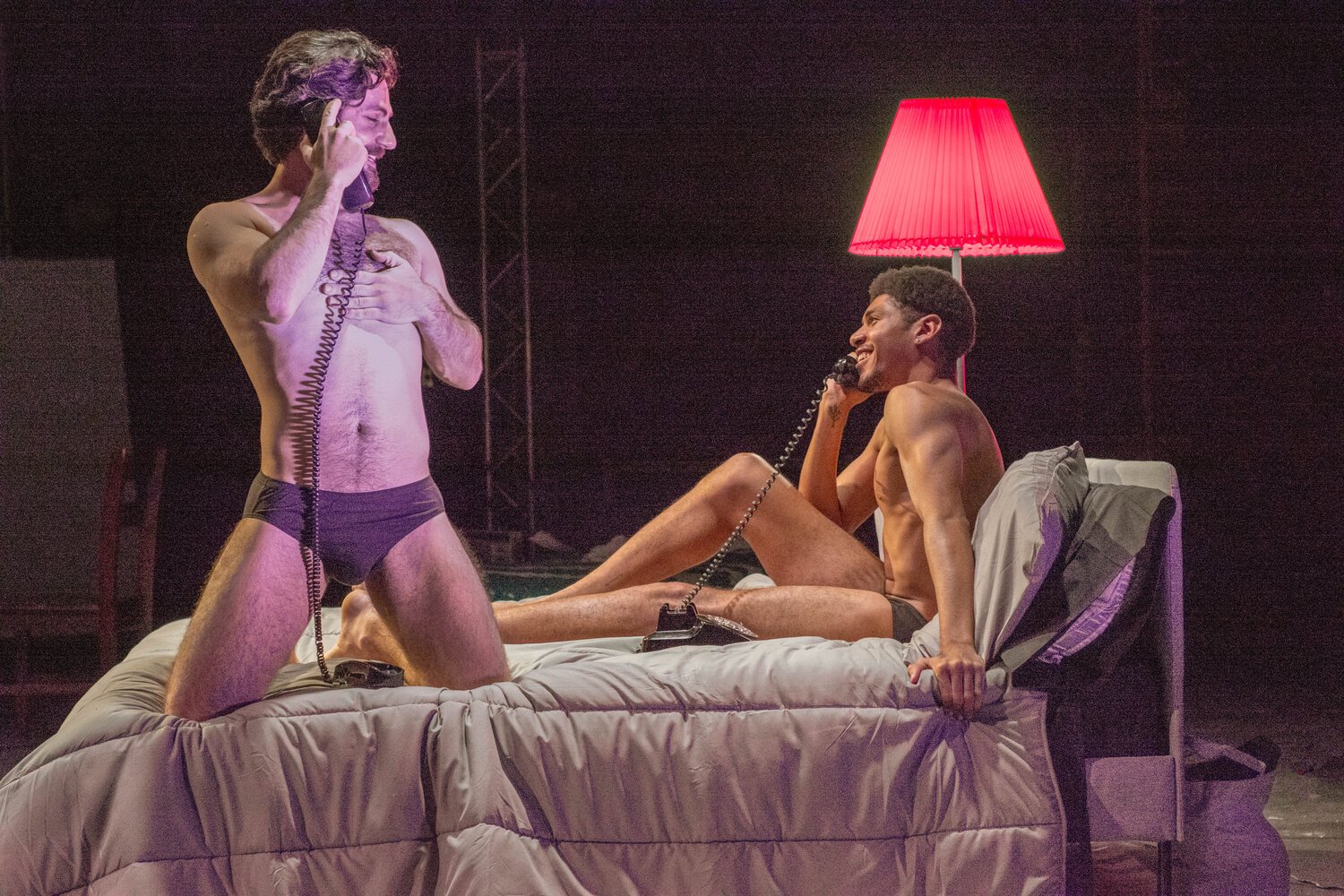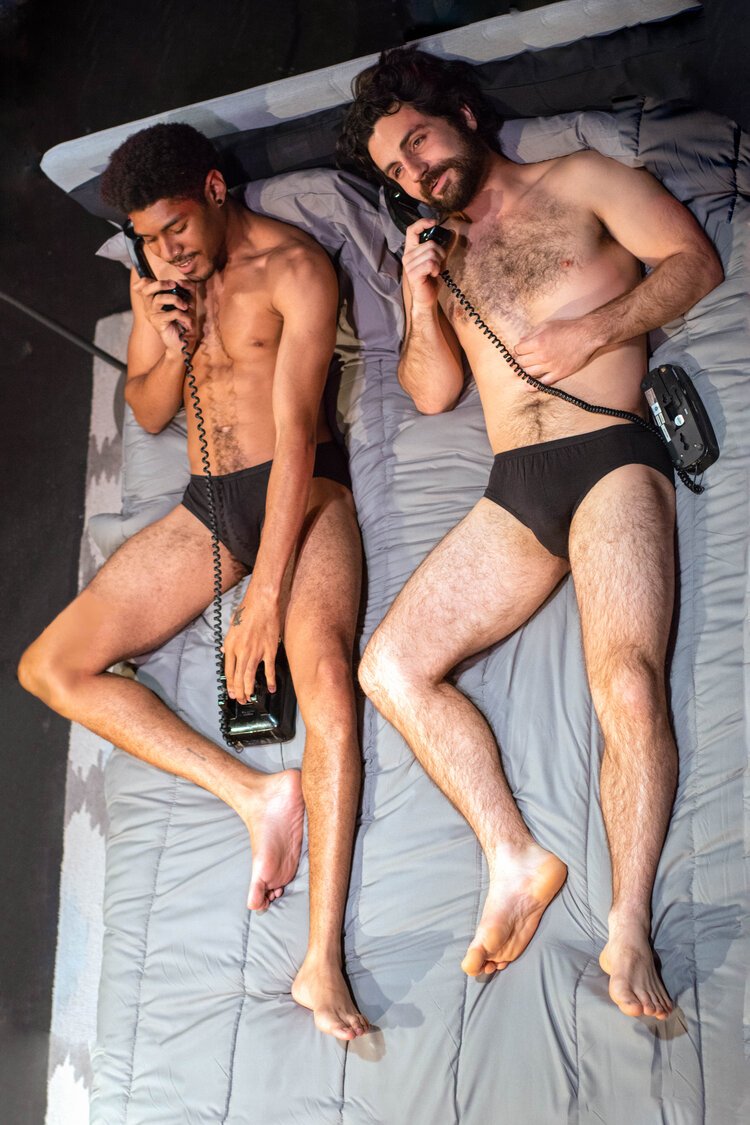A History of Love Among Strangers: 'Jerker' at Out Front Theatre
PHOTO: TYLER OGBURN PHOTOGRAPHY
Written and originally staged in Los Angeles in 1986, Robert Chesley’s one-act play Jerker bears a lengthy subtitle that evocatively suggests its themes and general structure; its full title is Jerker, or The Helping Hand: A Pornographic Elegy with Redeeming Social Value and a Hymn to the Queer Men of San Francisco in Twenty Phone Calls, Many of Them Dirty. Unlike other, more epically scaled dramatic depictions of the emerging HIV/AIDS crisis during the 1980s — including Tony Kushner’s Angels in America, Larry Kramer’s The Normal Heart, and, more recently, Pose on FX — Jerker focuses on just two characters, a Vietnam veteran called “J.R.” and a San Francisco businessman named Bert, and the relationship that develops between them over the course of twenty phone calls. At first these calls mostly consist of verbal roleplay as each character masturbates while recounting his erotic fantasies and memories to the other, identifying each other (as many gay men do, explicitly or not) as “brothers.” As the play progresses, J.R. and Bert’s conversations become more personal and revealing, and their initial sexual connection becomes charged with a deeper intimacy. Only during the play’s final third or so does the viewer realize that Jerker is a double entendre: sure, it’s an obvious reference to jerking off, but it’s also, more subtly, an abbreviation of tearjerker.
The play’s tight dramatic focus and unabashed horniness are among the assets that translate best to the screen in Out Front Theatre’s production of Jerker, which is available to stream on-demand on the company’s website through the end of June. This particular production’s assets also undoubtedly include the often scantily clad, muscled physiques of actors Tyshawn Gooden (J.R.) and Greg Piccirilli (Bert), who appear to genuinely share vital chemistry as the play’s two central characters. Onstage, filmed in a dark theater, the two actors each occupied a bed on either side of the set, lit by spotlight. Onscreen, this broad view of J.R. and Bert is generally modified by split-screen presentation, a visual effect that feels remarkably unobtrusive given that the play is structured around a series of telephone calls. As can be reasonably expected, the sound effect for a ringing telephone and the transition music between scenes are conveyed less smoothly in virtual presentation, but the viewing experience remains satisfyingly coherent overall. It’s entirely possible to enjoy watching the play without being distracted by the fact that it was previously filmed and is not happening live in front of you.
In some ways, viewing Jerker at home — on a laptop, possibly in bed like J.R. and Bert — feels appropriate, perhaps even preferable to seeing it live. The word pornographic is not out of place in Jerker’s long subtitle: the explicit dirty talk that comprises most of the dialogue in the play’s first several scenes would be familiar not only to phone sex aficionados but also those who engage in such conversations using more recently developed digital forums such as online chat rooms and hookup apps. For all its usefulness as a document of a previous era of gay life, this relatable horny banter draws a comforting throughline across generations, offering a reminder that gay men have always found ways to say to each other, “Are you hard? Are you touching yourself?” While it remains worthwhile to consider how apps and the internet have affected gay sociality, it also feels important to remember the common experiences that have not changed, to remind ourselves that our queer desires — to kiss another man, to be tied up against a tree and edged, to coach a stranger to orgasm — are nothing new.
After half a dozen or so sessions of phone sex, a sobbing Bert reveals that a friend of his, David, is dying of AIDS in the hospital. This disclosure is a turning point in the characters’ relationship, creating an opportunity for them to tenderly reflect on the sense of sexual liberation and connection that is being viciously diminished by the onset of AIDS. “It was loving... even if you didn’t know whose cock it was in the dark, or whose asshole you were sucking,” Bert declares, “and I don’t regret a single moment of that. I’m not sorry.” This directly unapologetic attitude toward what some would reductively characterize as promiscuity distinguishes Jerker with a mark of artistic integrity, an unwillingness to sanitize or censor the lascivious details of gay men’s sex lives despite acknowledging the ravaging effects of risky sexual behavior. And yet, though it involves detailed sexual fantasies, the bond shared by J.R. and Bert is not exclusively physical. “Loving can’t be killed, it’s stronger,” J.R. says at one point. “That’s why, even though I can’t hold you, telling you I want to, it helps me.”
Near the play’s conclusion, Bert — coughing into his telephone receiver, saying he’s come down with the flu — asks J.R. to tell him a bedtime story. J.R. confesses what he says may have been his first fantasy, before he really understood what was possible sexually between two men. He weaves Bert into the story, imagining them as brothers, fairytale princes who fight their way through a dark forbidden forest to discover a castle where a beautiful man waits for them, a man “made out of magic and music” who lets them know they’re safe and holds them. During this story is the only time the physical separation between the two characters is closed, as Gooden’s J.R. crossed the stage to sit in bed with Piccirilli’s sickly Bert, in a moment tinged with magical realism. Behind them, the darkness that blankets other scenes is replaced by soft purple light. It’s the only moment I really wished I could have seen the play live. But, of course, had I seen Jerker in a theater, it wouldn’t have been possible for me to spend much of its duration, like its characters, with one hand under the covers.
Jerker is available to stream on the Out Front Theatre website until the end of June.
—
Logan Lockner is a writer in Atlanta. His essays and criticism have appeared in publications including GAYLETTER, 032c, Art in America, and frieze. Previously, he was editor of Burnaway.
Archive
- September 2025
- August 2025
- May 2025
- February 2025
- November 2024
- October 2024
- September 2024
- August 2024
- July 2024
- June 2024
- May 2024
- April 2024
- October 2023
- July 2023
- June 2023
- May 2023
- April 2023
- March 2023
- February 2023
- June 2022
- April 2022
- March 2022
- January 2022
- December 2021
- October 2021
- September 2021
- August 2021
- July 2021
- June 2021
- May 2021
- April 2021
- March 2021
- February 2021
- January 2021
- December 2020
- October 2020
- September 2020
- August 2020
- July 2020
- June 2020
- May 2020
- April 2020
- March 2020
- February 2020
- January 2020
- December 2019
- November 2019
- October 2019
- September 2019
- August 2019
- July 2019
- June 2019
- May 2019
- April 2019
- March 2019
- February 2019
- January 2019
- December 2018
- November 2018
- October 2018
- September 2018
- August 2018
- July 2018
- June 2018
- May 2018
- April 2018
- March 2018
- February 2018
- January 2018
- December 2017
- November 2017
- October 2017
- September 2017
- August 2017
- July 2017
- June 2017
- May 2017
- April 2017
- March 2017
- February 2017
- January 2017
- December 2015
- November 2015
- October 2015
- September 2015
- August 2015
- July 2015
- June 2015
- May 2015
- April 2015









